Top Hunting Dog Breeds Every Dog Lover Should Know About
Hunting dogs have been trusted companions to hunters for centuries, prized for their sharp instincts, loyalty, and specialized skills. These breeds are purposefully trained to track, flush, or retrieve game, making them indispensable in the field. Whether you’re drawn to the agility of Spaniels or the endurance of Hounds, there’s a perfect match for every hunter’s needs. Beagles, for instance, are celebrated for their keen sense of smell, ideal for tracking scents explore more about Beagles’ traits here.
From retrieving fallen birds to chasing fast prey, these dogs showcase unique traits tailored to diverse terrains and tasks. Understanding these breeds for aspiring or seasoned hunters ensures better hunting outcomes and a deeper bond with your canine partner.
Table of Contents
What Are Hunting Dog Breeds?
Hunting dog breeds are a unique group of dogs bred specifically to assist hunters in the field. These dogs aren’t just loyal companions; they are trained to contribute various skills, such as tracking, retrieving, and even flushing out games. They are purposefully designed for the task, with physical and mental traits that set them apart from other breeds. Understanding their purpose and unique characteristics can help you make the right choice if you’re considering having one.
Their Specialized Purpose in Hunting
Hunting dogs are versatile and efficient helpers in the field. They are trained to perform tasks such as:
- Scenting: Certain breeds, like Beagles, are excellent at following scents, making them perfect for tracking down elusive prey.
- Retrieving: Dogs like Labrador Retrievers are skilled at retrieving games from land or water. Learn more about Labrador Retrievers’ traits.
- Flushing: Breeds like Spaniels excel at flushing out birds or small animals from dense cover for hunters to take their shots.
Each task requires instinct, intelligence, and relentless energy, making these breeds indispensable to hunters.
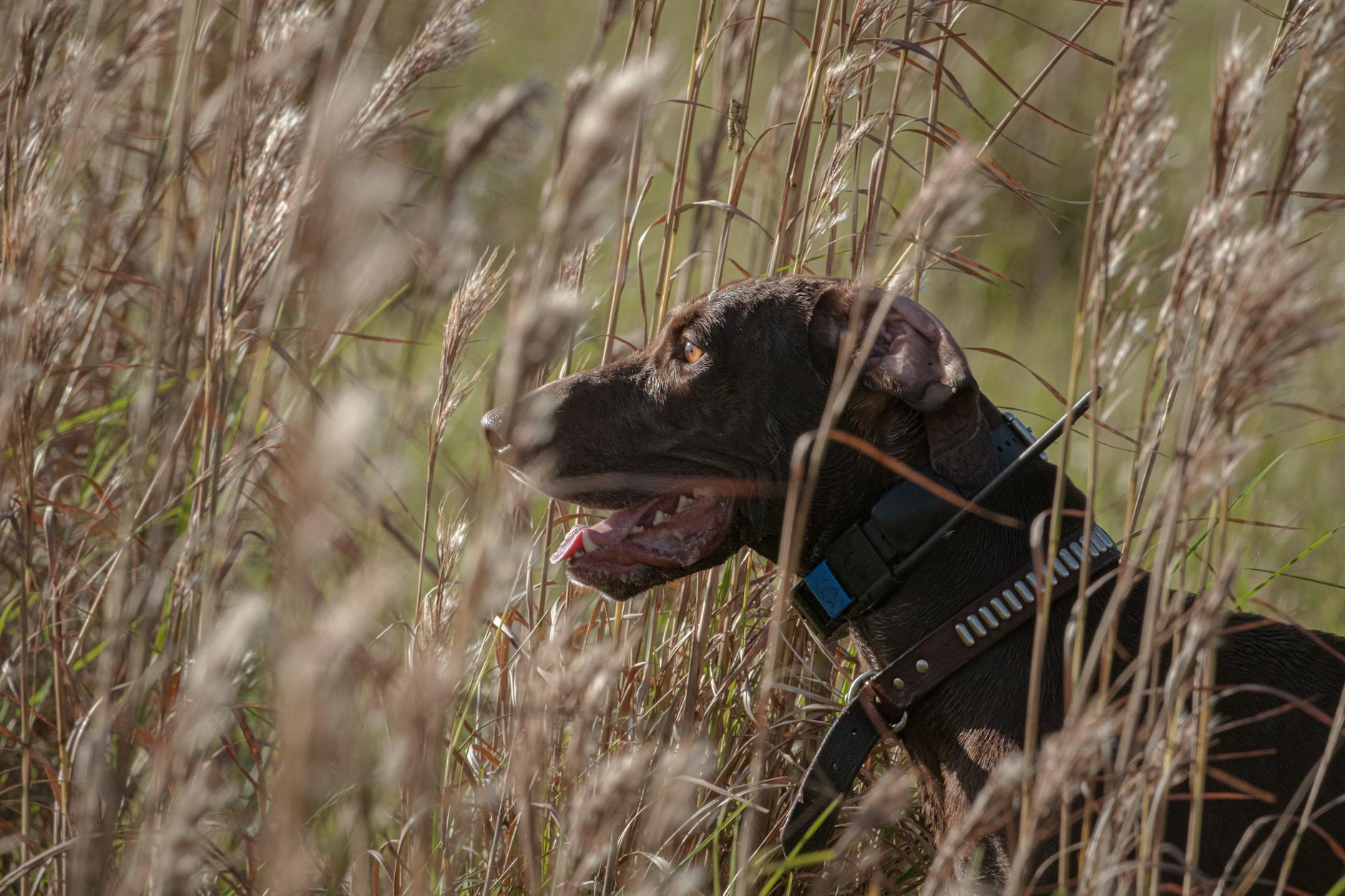
Photo by Arian Fernandez
Physical Traits That Define Hunting Breeds
Hunting dog breeds are built for action. They typically share the following physical attributes:
- Endurance and Agility: Hunting involves long hours and challenging terrains. Breeds like the German Shorthaired Pointer thrive in such situations.
- Sense of Smell and Hearing: A heightened sense of smell is essential for tracking. Hounds, for instance, are unmatched in this ability.
- Coat Types: Their coats are often designed for the environment they’ll work in. For example, water-resistant coats in Retriever breeds aid in moist or rainy conditions.
Categories of Hunting Dogs
Hunting dogs can generally be divided into three main groups:
- Scent Hounds: These dogs rely primarily on their nose. Popular examples include Beagles and Bloodhounds.
- Bird Dogs (Gun Dogs): Known for their precision, these include Pointers, Retrievers, and Spaniels. For instance, the Cocker Spaniel has a rich history as a bird hunter. Explore its unique characteristics.
- Terriers: Lightweight yet courageous, these breeds are used to hunt smaller prey like rodents.
Why They Make Great Companions
Beyond their hunting expertise, these dogs are incredibly loyal and intelligent. Their strong bond with owners makes them one of the most rewarding breeds to train and work with. Interested in the best dog breeds for hunting? Check out this list of top hunting dog breeds.
Types of Hunting Dog Breeds
Hunting dog breeds come in various types, each with unique skills and attributes. These loyal companions are tailored to meet specific needs, helping hunters achieve optimal performance in the field. Let’s explore some of the most notable categories of hunting dog breeds.
Pointing Breeds
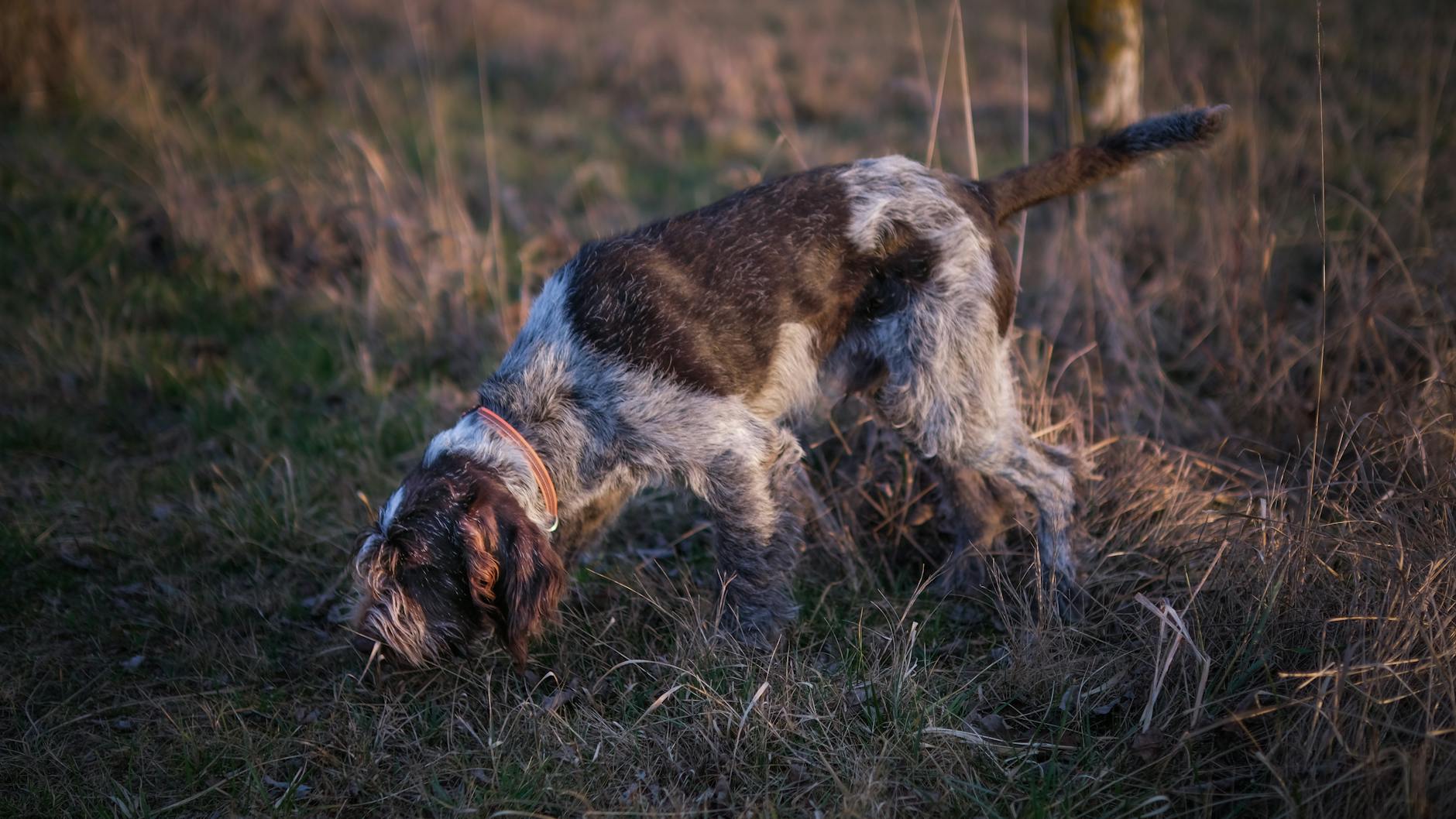
Photo by Andreas Schnabl
Pointing breeds are known for their remarkable ability to detect game and “point” their hunter in the right direction. Perhaps the most iconic member of this group is the English Pointer. These dogs are built for endurance, often covering large land areas with precision and speed. Their lean bodies and sharp focus are ideal for bird hunting, especially in open terrains. Pointing breeds are typically calm yet alert—a perfect balance for hunters who rely on efficiency—Are you interested in more hunting breeds with exceptional traits? Check out this guide.
Retrieving Breeds
Retrieving breeds are indispensable for fetching downed game, particularly birds. Labrador Retrievers, for example, are famed for their work ethic and eagerness to please. They thrive in both water and land retrieval, making them versatile partners. Labs have a soft mouth, meaning they handle the game gently without damaging it—a trait highly valued by hunters. Whether it’s ducks, geese, or upland birds, these dogs excel in bringing back the prize. For those curious about this group, learn more about the best retrieving breeds for hunting.
Flushing Breeds
Flushing breeds are masters of startling prey out of hiding, flushing it into the open for hunters. The Cocker Spaniel stands out in this category thanks to its compact frame and high energy. These dogs work closely with hunters, navigating through thick brush with ease. Their keen senses and enthusiasm make them relentless when working in the field. Unlike trackers or pointers, flushing dogs are about action, driving the hunt forward. This breed type is perfect for those who love a lively, responsive companion during hunts.
Tracking Breeds
Tracking breeds specialize in following scent trails to locate elusive game, often across long distances. The Bloodhound is legendary for its unparalleled sense of smell. Initially bred for tracking people, these dogs have transitioned seamlessly into game hunting. Bloodhounds are incredibly determined, able to pick up faint scents and follow them even in challenging conditions. This breed is the epitome of persistence, never giving up until the trail is complete. Want to learn how tracking dogs contribute to hunting success? Explore a comprehensive list of hunting breeds here.
As each breed plays a unique role in the field, hunters can confidently choose a companion that aligns with their game and terrain preferences. By understanding the strengths of these breeds, you’ll be better equipped to create an unforgettable hunting experience.
Characteristics of Hunting Dogs
Hunting dogs stand out for their unique blend of physical attributes, temperament, and intelligence, and they are fine-tuned for performance in the field. These traits, honed over generations, make them reliable and indispensable partners for hunters. Let’s take a closer look at what makes these dogs exceptional.
Physical Abilities: Stamina, Speed, and Agility
Hunting dogs are built like athletes. Stamina is one of their key strengths, enabling them to stay active for hours without tiring. Whether it’s a Beagle tirelessly tracking a scent trail or a Pointer covering large distances, endurance is essential for the hunt.
Another crucial trait is speed, especially for breeds like Greyhounds, known for their lightning-fast reflexes. This allows them to close in quickly on fast-moving prey.
Lastly, agility is a hallmark of hunting dogs. They can navigate challenging terrains like forests, tall grasses, or wetlands with finesse. Imagine a Springer Spaniel leaping effortlessly over obstacles in pursuit of a bird. Their physical build ensures they can handle any challenge nature throws their way.
Temperament: Behavioral Traits that Benefit the Hunt
Hunting dogs are not just physically fit; they possess a temperament suited for the task. One of the most essential traits is focus. These dogs can stay locked onto a task, whether following a scent or flushing out a game.
Another valuable characteristic is bravery. Hunting involves unpredictable encounters, and these dogs are fearless in facing challenges. A terrier, for example, won’t hesitate to confront burrowing animals in their dens.
Loyalty is another defining trait. Hunting dogs form strong bonds with their handlers, responding to cues and commands precisely. This strong relationship is key to successful teamwork during hunts. Interested in learning about breeds with strong hunting instincts? Explore more here.
Trainability: The Importance of Obedience and Intelligence
Trainability is what separates a good dog from a great hunting companion. These dogs are eager to learn and respond well to consistent training, making them a joy to work with. Breeds like Labrador Retrievers and German Shepherds are known for their obedience and quick learning.
Commands such as “stay,” “retrieve,” or “track” become second nature to well-trained hunting dogs. Their intelligence means they’re reactive and can anticipate what’s needed next, adding strategic value during hunts.
Additionally, a well-trained hunting dog adapts seamlessly to different scenarios. For instance, a retriever knows when to quietly wait for its turn or jump into action when a duck is downed. Want tips on picking a hunting dog with superior trainability? Check out this expert guide.
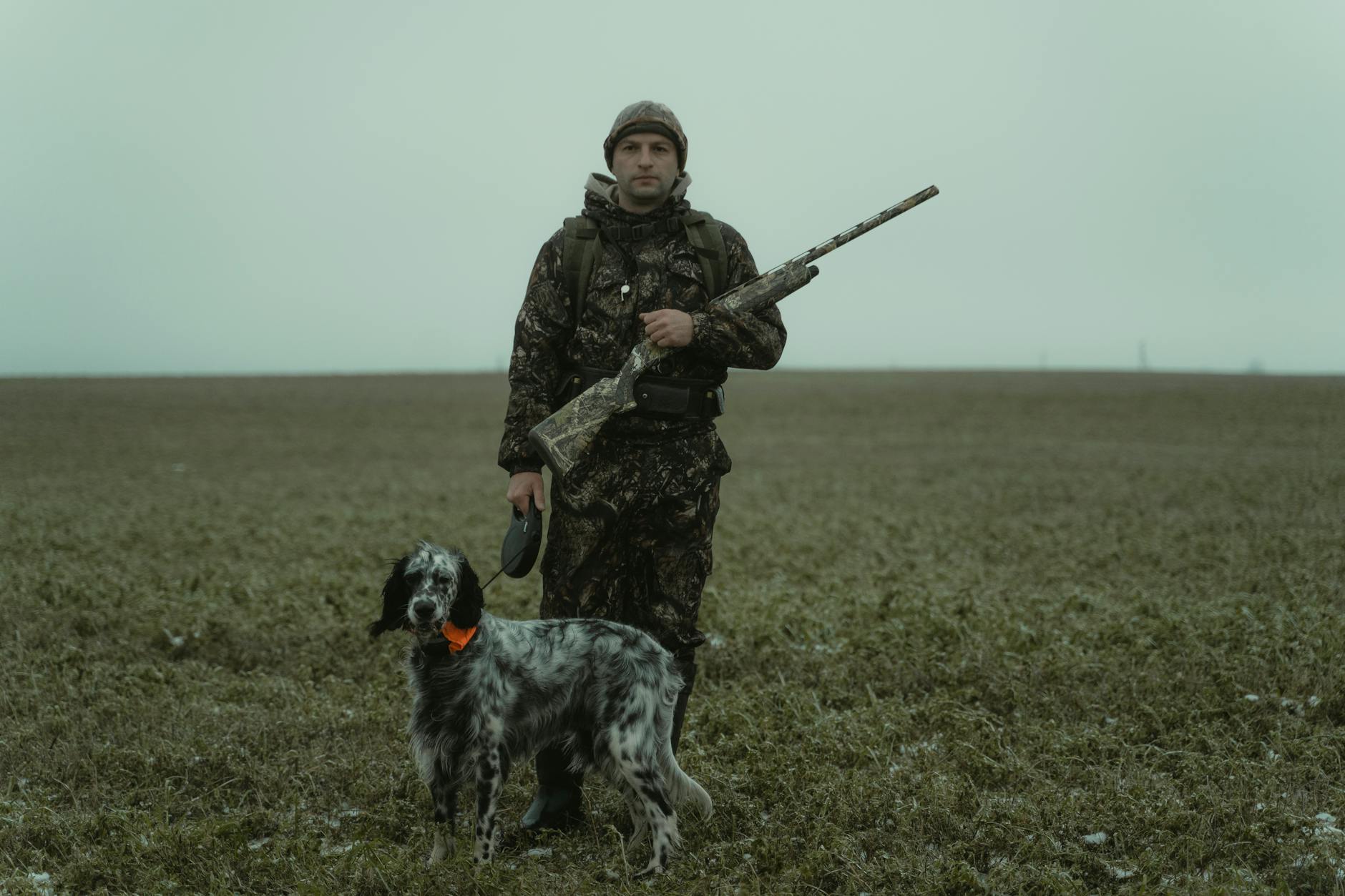
Photo by Tima Miroshnichenko
Caring for Hunting Dog Breeds
Caring for a hunting dog breed requires attention to their active lifestyle, unique training needs, and health maintenance. These dogs are not just pets but partners with a serious job. Whether tracking scents, flushing games, or retrieving birds, they demand specialized care to keep up with their energy and instincts.
Nutrition Tips
Feeding your hunting dog isn’t just about filling their bowl. These dogs thrive on a balanced diet tailored to their high-energy activities. Protein is a cornerstone of their diet, supporting muscle recovery after long days in the field. Healthy fats serve as a critical energy source, while carbohydrates provide quick bursts of fuel.
To ensure peak performance, consider:
- High-protein kibble: Look for dog food with lean protein sources like chicken or fish.
- Special supplements: Add omega-3 fatty acids to promote joint health, especially for breeds like Labrador Retrievers that spend time retrieving in water or rough terrain.
- Portion control: Avoid overfeeding; an overweight hunting dog risks joint strain.
For more detailed tips on tailoring your dog’s nutrition, visit Best Dog Food for Hunting Dogs | Top 12 Choices.
Training Recommendations
Training a hunting dog is more than just teaching tricks; it’s about building teamwork. Start training early—puppies soak up skills like a sponge. Focus on these key areas:
- Obedience drills: Commands like “sit,” “stay,” and “retrieve” set the foundation for more advanced tasks.
- Positive reinforcement: Reward desired behavior with treats or praise. It strengthens their bond and keeps sessions enjoyable.
- Simulations: Practice in hunting environments. For example, introduce water work for retrievers or scent trails for hound breeds.
Consistency is king. Training takes time, but the payoff in the field is worth it. Check out The Ultimate Guide to Labrador Retriever Care for more insights on training.
Health and Maintenance
Hunting dog breeds need routine health care to stay in top form. Their active lifestyle puts them at higher risk for specific issues, like joint problems or cuts from dense brush.
Key care practices include:
- Grooming: Regular brushing keeps their coats healthy and free from debris. Short-haired dogs, like Pointers, require minimal grooming, while Spaniels need extra attention.
- Paw care: Inspect their paws for scratches or thorns after every outing. Protective dog boots can be helpful in rugged terrain.
- Vet visits: Schedule check-ups at least twice yearly to catch potential issues early. Vaccinations, parasite prevention, and joint monitoring are essential.
Proper care extends a hunting dog’s working years and improves their quality of life. For more advice, consider reading Essential Grooming Tips for Hunting Dogs.
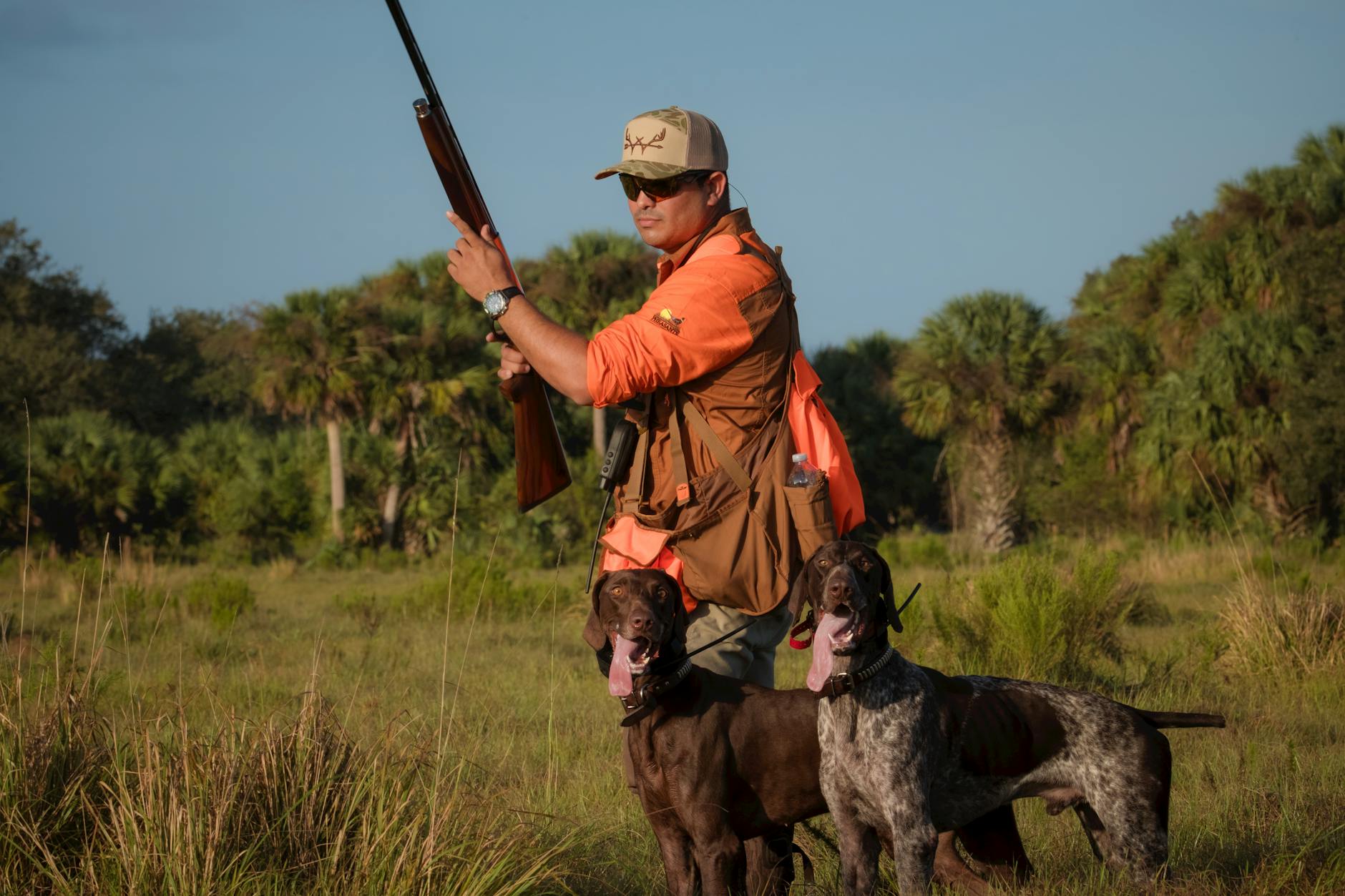
Photo by Arian Fernandez
Popular Hunting Dog Breeds
Hunting dogs have been uniquely bred for their specialized skills, from tracking scents to retrieving games. These breeds are excellent hunting companions and genuinely remarkable in their unique abilities and personalities. Explore some of the most popular hunting dog breeds and their distinctive traits.
Beagle: The Scent Hound Extraordinaire
Beagles are one of the best-known scent hounds in the hunting world. Originating as pack hunters in the United Kingdom, their roots trace back to ancient Greece. These dogs are prized for their exceptional sense of smell and tireless stamina. Beagles are specialists in tracking small game like rabbits and hares. Their compact size allows them to weave through dense undergrowth easily, while their persistence ensures they stay on the trail until the job is done.
Want to learn more about their traits? Check out 10 Fascinating Facts About Beagles.
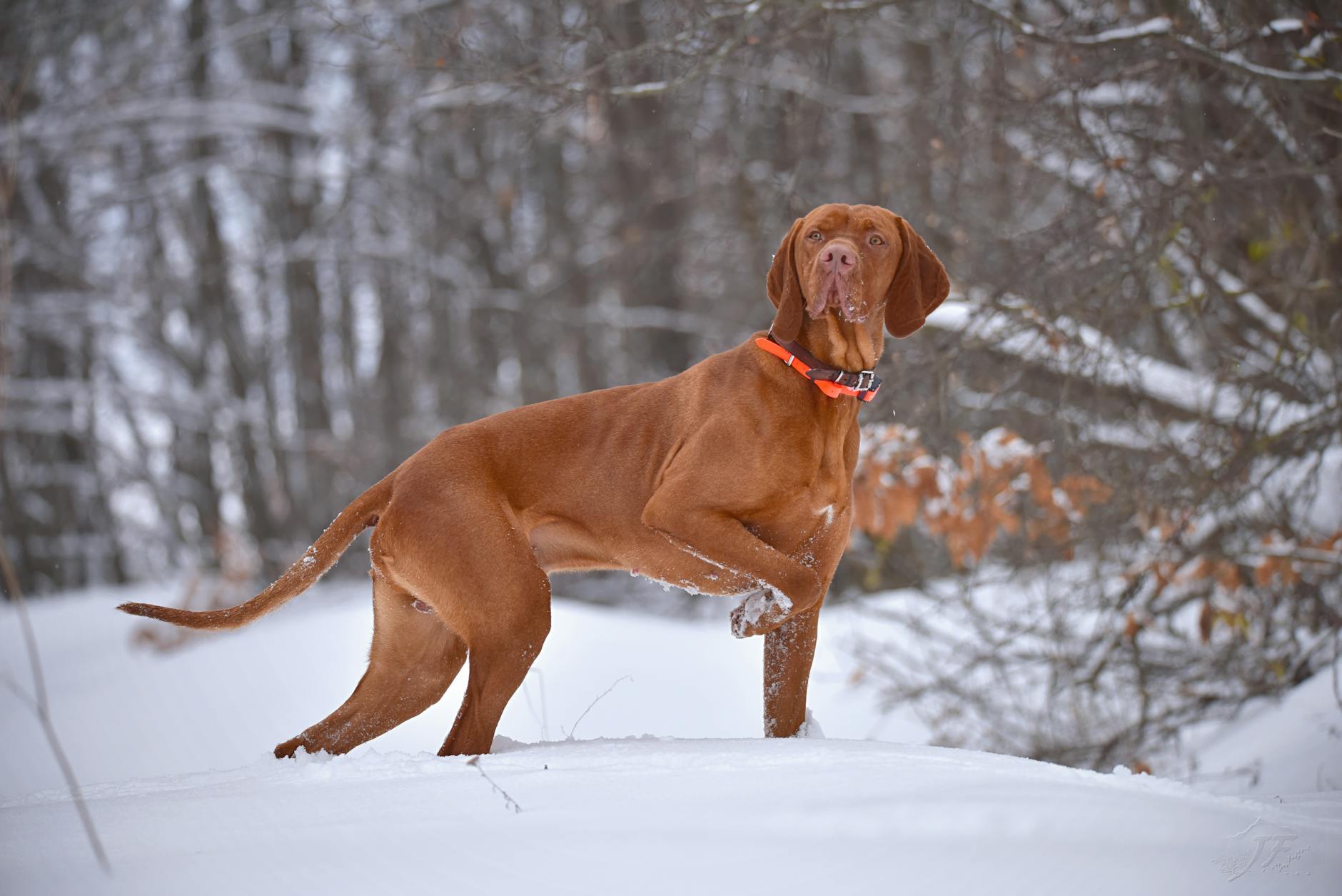
Photo by Jozef Fehér
Labrador Retriever: The Ultimate Multi-Purpose Hunter
Labrador Retrievers are a top choice for hunters around the world. Their intelligence, gentle demeanor, and eagerness to please make them fantastic family dogs and highly skilled retrievers. Labradors excel at retrieving waterfowl thanks to their water-resistant double coat and strong swimming ability. They possess a “soft mouth,” meaning they can carry the game without damaging it—a crucial skill when hunting birds.
Curious about caring for a Labrador? Don’t miss The Ultimate Guide to Labrador Retriever Care.
English Springer Spaniel: A Versatile Powerhouse
English Springer Spaniels are known for their incredible versatility. These dogs can flush game-like pheasants and quail and retrieve them, making them the perfect partner for upland game hunters. They are energetic and thrive on challenging tasks, often working tirelessly in rugged terrains. Their strong bond with handlers matches their keen enthusiasm for the hunt, making them reliable companions in any situation.
If you’re considering this breed, check out additional profiles such as Today’s English Springer Spaniel.
Golden Retriever: The Friendly Retriever
Golden Retrievers bring a unique mix to the hunting field—friendliness, intelligence, and unmatched retrieving skills. Due to their eager-to-please nature, they’re easy to train and excel in retrieving duties for waterfowl and upland birds. Their thick, water-resistant coat makes them well-suited for cold conditions, while their loyalty ensures they stick by their handler in every situation.
Looking to learn more about the Golden Retriever’s traits? Head over to Expert Guide: Unleash Your Golden Retriever’s Potential.
No matter your hunting style or the environment you face, each of these breeds offers unique skills and companionship that make them invaluable in the field. From Beagles’ persistence to Springer Spaniels’ versatility, these dogs are indispensable for hunters and beloved by dog enthusiasts everywhere.
FAQ About Hunting Dog Breeds
When hunting dog breeds, you might find yourself with many questions. From understanding their unique roles in the field to learning about their care and training, we’ve gathered some commonly asked questions and their answers to simplify your decision-making process.
What Are the Best Hunting Dog Breeds?
The best hunting dog breed depends on the hunting you’re doing. For example:
- Beagles excel at tracking small game like rabbits.
- Labrador Retrievers are champions in retrieving waterfowl.
- Pointers are ideal for locating upland birds with their “pointing” technique.
Each breed has unique skills tailored to its environment and prey. You can explore more about top breeds in this comprehensive guide.
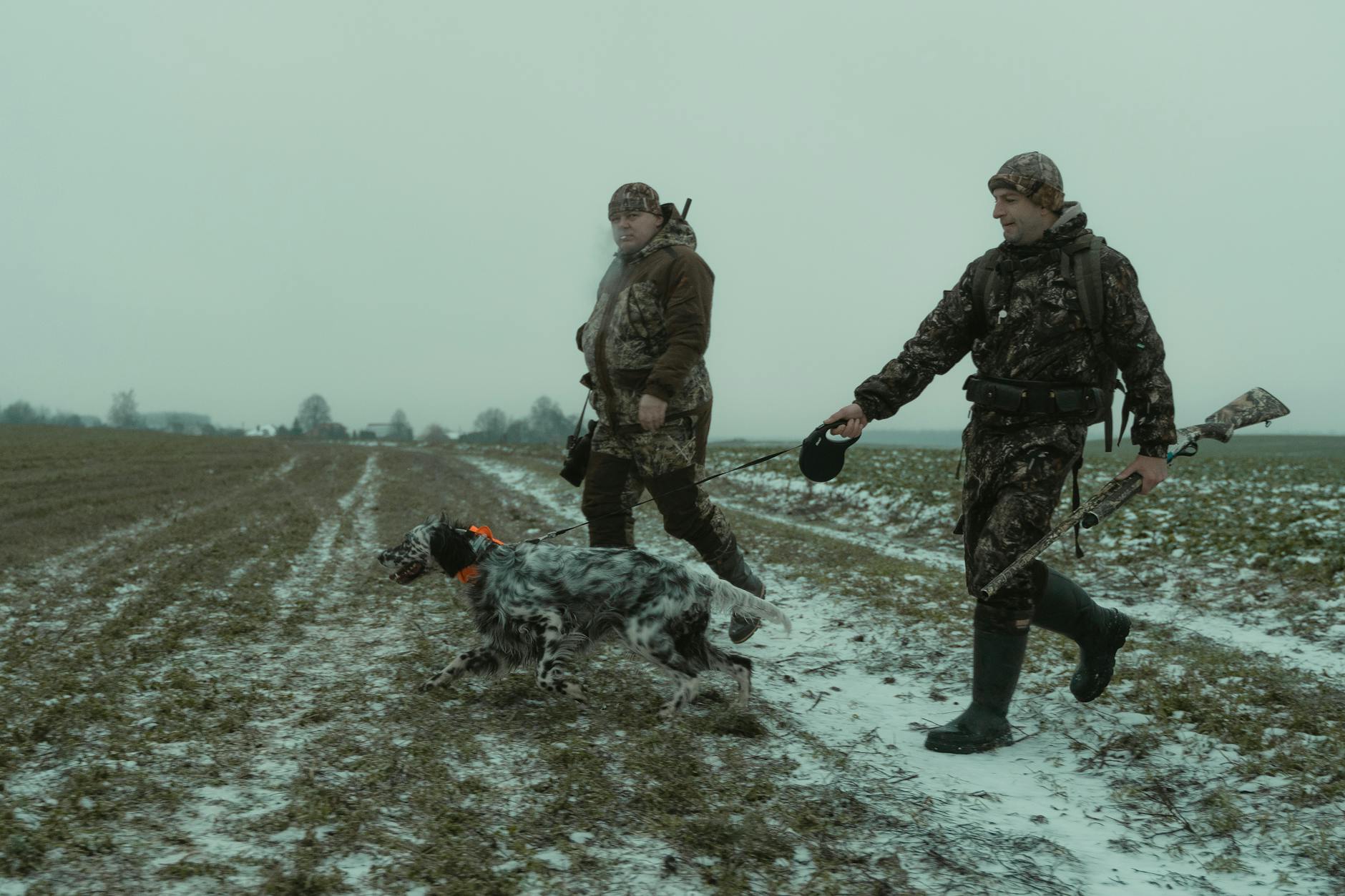
Photo by Tima Miroshnichenko
How Do Hunting Dogs Differ From Regular Dogs?
Hunting dogs are bred for specific skills like scenting, flushing, and retrieving. They’re often brilliant and have exceptional stamina to handle long hours in the field. Unlike regular pets, these dogs are also trained to assist hunters strategically by trailing game or retrieving prey without damaging it. Check out Gunners Review Where To Find Hunting Dogs if you’re curious about training specifics.
Can Hunting Dogs Be Family Pets?
Absolutely! Hunting dogs are loyal, friendly, and intelligent, making them great family companions. Breeds like Golden Retrievers and Spaniels are remarkably gentle and affectionate. However, their high energy levels mean they’ll need plenty of exercise and mental stimulation, even if they’re not actively hunting.
Do Hunting Dogs Need Special Training?
Yes, hunting dogs require focused and consistent training to master their skills. Start with basic obedience and gradually introduce tasks like tracking or retrieving. Use positive reinforcement throughout the process to keep them motivated. For tips on training hunting dogs effectively, check out this ultimate guide.
Are There Specific Health Issues in Hunting Breeds?
Hunting dogs are prone to specific health issues due to their active nature. Common concerns include:
- Joint problems in large breeds like Labradors.
- Ear infections, especially in breeds working in wetlands.
- Cuts and abrasions from navigating dense terrains.
Routine check-ups and proper care can prevent most of these issues. Learn more about caring for active hunting breeds here.
How Do I Pick the Right Hunting Dog Breed?
Choosing the right breed depends on the type of game you hunt and your living environment. If you need a dog for waterfowl hunting, consider retrievers. For tracking deer, scent hounds like Bloodhounds might be your go-to. Thinking about specific preferences? Engage with forums like this discussion on Reddit.
Understanding the basics of hunting dogs will help you make an informed decision and build a successful partnership with your canine companion.
Conclusion
Hunting dog breeds embody an extraordinary mix of instinct, endurance, and loyalty. Whether you need a scent hound to track prey or a skilled retriever to fetch your game, these dogs offer dependable companionship and unmatched expertise. Their traits extend beyond the field, making them fantastic family pets when their exercise and mental stimulation needs are met.
Choosing the right breed for your lifestyle and hunting style is essential. For a closer look at how various breeds fit into everyday living, visit Discover The Best Types For Every Lifestyle 2024.
Start your journey with a well-informed choice and foster a rewarding connection with your four-legged partner. Share this resource with others who share your love for these remarkable dogs.

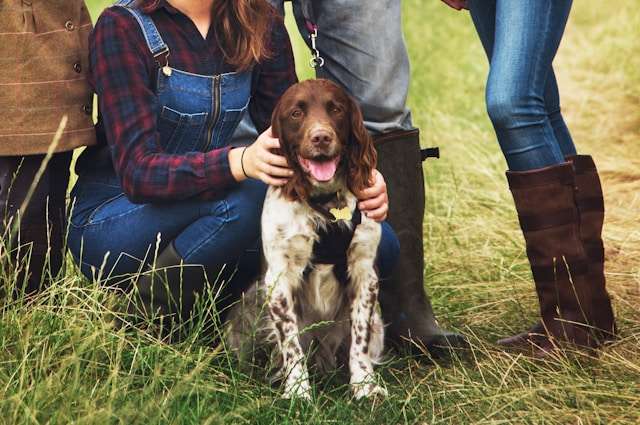

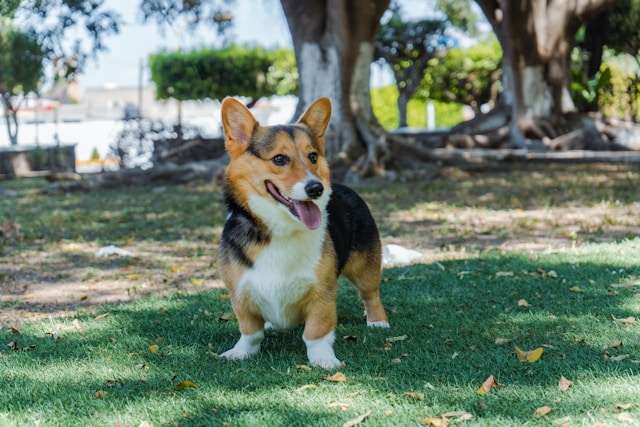



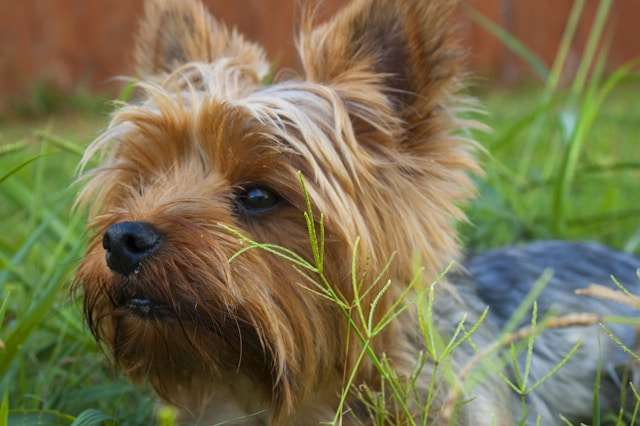
One Comment